- Home
- Beth Vrabel
A Blind Guide to Stinkville Page 2
A Blind Guide to Stinkville Read online
Page 2
“She’s got albinism, Ma.”
“‘S’at right?” She muttered in the slow southern twang I was still getting used to hearing. She seemed a little caught off guard, but didn’t have the bad cheese face.
It’s kind of funny. When I lived in Seattle, everyone I knew had always known me. Like Eliza and I had been in the same playgroup when we were babies. Our neighbors had never moved. My elementary school teachers had all taught James before me. Everyone knew everything about me without my ever having to tell them. So I had never had to explain albinism, blindness, or nystagmus to anyone before. They already knew.
But here I was in this library for less than an hour, and I already had to tell three people I was blind. This third time it just sort of slipped out.
“Ma, this is Alice. She’s new to town,” Kerica said.
“Welcome, Alice. I’m Mrs. Morris. Make sure your dog doesn’t do-do in the library.” Mrs. Morris started to walk away, then turned back suddenly and rubbed Tooter’s head. This was seriously the dog’s best day ever.
Honestly, it was my best day ever in Stinkville, too.
Chapter Two
Tooter and I went to the library every day for the next two weeks. In fact, I was pretty sure we’d be at the library every day forever, so long as I could get James to walk me there. I even packed a lunch for each day (fluffernutter sandwich, string cheese, and an apple that I never ate, but I felt obligated to include something from that food group). I also shoved a bottle of sunscreen in the bag after James guilted me into it.
“I got sunburned yesterday,” he said. And he was right. His nose was a bright pink color. He and Mom have brownish skin, like they have permanent tans. They both have thick, wavy black hair. Mom’s falls to the middle of her waist and is smooth as water when she washes and dries it. Lately it’s been in a heavy ponytail or a wild nest around her head, though. James’s hair is all over the place, growing down over his forehead and ears and curling up around his neck.
I put my floppy sunhat on my head and coated my arms in sunscreen. Mom kept both stocked in a basket beside the door, so I had no excuses to forget either. Even though we left about nine o’clock in the morning, it was still early enough for my arms to pink up by the time we finished the fifteen-minute walk to the library.
When we woke Mom up that morning, James had told her that he was going to play basketball at the park with some guys. This was news to me since I hadn’t seen him with anyone since we moved here. In Seattle, he always had hordes of friends around. But Mom just nodded and said to be sure to drink a lot of water.
It’s like she’s sort of there lately, once in a while saying Momish things, like, “stay hydrated” and “wear a hat.” The next day, she might look surprised to see that you’re there, sitting in the living room. Dad says she just needs time to adjust and that we should give her space. Dad certainly is giving her space. He says all the friends we had in Seattle kept her busy and happy. But he’s too busy to be around a lot lately. He’s gone to the Mill by the time I wake up in the morning and he’s back just before—or after—Mom has dinner on the table.
Mom might not be doing her usual what-are-you-really-up-to stuff with James and just taking him at his word that he’s playing basketball at the park, but when we passed the park on the way to the library I noticed there weren’t any guys there. James didn’t even have a basketball with him. Instead, he had his skateboard! And now that he had dropped me off at the library, he was heading in the opposite direction from the park.
So far, I’ve seen two things total in Stinkville: the library and the park. And I’ve only seen the park because we pass it on the way to the library.
“Where are you going?” I called to him.
“To the lake.” James didn’t even turn around.
“There’s a lake?”
He ignored me, so I shouted, “What kind of lake?”
“The kind with water.” Then he threw his skateboard down so it bounced once before he jumped on and wheeled away.
Tooter growled at him and leaned his stubby body against my leg. The dog had never growled at James before. Apparently he was suspicious, too.
“You can’t swim!” I shouted in one last attempt to get him to come back.
Two teens walking into the library laughed loudly at that. James was too far away for me to see, but I was pretty sure his ears were red. That’s always what happens when I embarrass him. But it was true! He can’t swim. He hates getting his ears wet.
“Don’t drown!” I added.
I couldn’t quite make it out, but I’m pretty sure he flashed a finger he’s not supposed to at me.
Tooter tugged at the leash, then raised a leg and peed on the M. H. Bartel Public Library sign. The males in my life are obnoxious.
Rain clouds gathered as I waited for James outside the library that afternoon. They were big enough to spot, gray against white. Even more than that, though, I could smell them. Stinkville gets even stinkier on rainy days. All those clouds act like a tarp to keep the rotting egg smell pushing down on us.
I kept glaring toward the supposed lake for James to appear, but so far nothing. The air was so warm and wet my skin was already damp. Tooter lay on his side on the sidewalk.
“Don’t give up,” I said to him. “James is just a little late.”
Tooter turned around so he was facing the bench where I sat. He bounced twice, getting ready to jump up. When he finally tried the jump, he ended up ramming the edge of the bench with his shoulder, fell back down, turned in a circle a couple times, and lay down.
I had texted James fifteen minutes earlier that I was ready to go and so far nothing. No response.
I chewed on my lip and tried to ignore the thump, thump, thump in my chest. My stupid heart was jumping to conclusions. There was a perfectly good reason James didn’t respond and hadn’t shown up.
Like maybe his cell phone battery had died and he didn’t know it yet.
Maybe he got distracted by something but was on his way now.
Or maybe he was lying at the bottom of a lake, drowned.
A distraction! That’s what I needed. I thought instead about Sandi Williams. The beautiful, tan blonde girl had been sitting with Kerica on a hand chair when I arrived at the library that morning. The girl was chattering on and on to Kerica, who stared hard at the book in her hands, holding it up over her face the way I have to in order to read. But I knew Kerica didn’t need to, so I wasn’t sure what was going on. I didn’t want to interrupt them, but I didn’t know what to do with myself, either.
“So, my mom brought back this gorgeous scarf—Hermes—from Paris. It’s silk. She’s in Germany right now, but she’ll be back by the weekend. We’re going to go into the city for sushi and she’ll tell me all about what she did. I’m sure it involved some shopping. I don’t know what Germany is famous for, but I’m sure I’ll get some of it soon. That’s just the way my mom is, you know. We both get our space. We’re not on top of each other all the time, like some families.” There was a slight pause, during which I swear I heard Kerica sigh softly. She definitely turned the pages of her book with way more force than necessary.
Then the girl continued, “Not that there’s anything wrong with how you’re here with your mom right over there all the time, but there is no way that would work for us. But sometime soon Mom is going to take me along on one of her trips. Maybe to Norway next month or . . .”
I guess Tooter had enough of her prattling, or maybe he was mad about not getting space on the chair, because this time he tugged forward on the leash so he was at the girl’s feet. Then he growled long and hard. I had never heard him do anything like that before. Fart on a stranger? Certainly. Growl? Never.
“I’m so sorry,” I blubbered, pulling back on the leash. But Tooter, though small, is freakishly strong. He dug in his heels and wouldn’t move.
“Do you know that you’re not allowed to have dogs here?” the girl said. She crossed her arms and tilted her head towar
d me. All the gushiness of her voice when she spoke with Kerica was gone. Now it sounded burn-you-with-ice frosty.
Tooter tilted his head right back at her, giving the girl the stink eye. I could picture it: the whites of his eyes showing around the colored part.
“Especially vicious dogs,” she added.
Tooter turned and pranced over to Kerica, landing in her lap with one leap. He turned around once then sunk down with his head resting on the top of the chair’s thumb. He gave the girl the sideways eye again and growled super softly.
“As it happens,” said Kerica in a super crisp voice, “Tooter is welcome at the library. He’s Alice’s service animal.”
“Who is Alice?” the girl gasped.
“Um. Me.” I stepped forward awkwardly. “I’m Alice.”
Kerica jerked her hand toward the girl. “Alice, this is Sandi. She takes classes with my mom a couple times a week. Sandi, Alice.”
The girl turned toward me, her eyes raking me from my sunhat, my still-dark glasses, my white blonde hair, and my pale skin. I was close enough to notice that her cheeks had flushed when Kerica mentioned she took classes with Mrs. Morris.
“Tooter is a Seeing Eye dog,” Kerica said. Tooter farted.
“But she’s not blind. She just looked at me and smiled,” Sandi said.
“Yes, she is,” Kerica snapped.
I just stood there, like a statue.
Sandi actually stood up and moved closer to me. Since I was still holding the end of Tooter’s leash, and Tooter was curled up on Kerica’s lap, I wasn’t able to move. She was so close I could smell her minty breath.
“How many fingers am I holding up?” she asked.
“It’s a trick question,” I finally mumbled. “You’re not holding any fingers up.”
“Ha!” Sandi squealed.
Kerica sighed again. “She has albinism and is technically blind. But that doesn’t mean she doesn’t see anything.”
“Albinism?” Sandi frowned, her cute little nose wrinkling while she studied me again. “Like an albino?”
I nodded.
“I believe most people with albinism dislike that term.” Kerica flipped the pages of her book loudly, not looking at us. She bit off each word with a snap.
“I’ve never actually seen one of you before,” said Sandi, still standing too close for comfort.
“Well, we don’t normally come out in the daylight. Usually we only leave our caves at night,” I spat out.
Kerica snorted, then all-out laughed, which made me giggle, too.
Sandi didn’t move. She just kept staring.
“That was a joke,” I finally said.
Sandi didn’t twitch but kept staring at me. My glasses had transitioned to clear by then, so I really had nothing to do but stare right back.
“Shouldn’t your eyes be pink? I mean, I thought albinos had pink eyes,” she said.
“Nope, that’s just rabbits. People with albinism have blue eyes, like mine.” Sandi squinted into my eyes and I prepped myself for question number two.
“Why are your eyes . . . ? Are you . . . ?”
“It’s called stagamus,” Kerica said in a duh-everyone-knows-that tone. She lay her head back on a chair finger like our conversation was so completely boring.
“It’s, um, nystagmus. Another thing all people with albinism have. It means my eyes move back and forth all of the time,” I said.
“How can you see?” Sandi finally spit out.
Kerica shifted in her seat. Tooter farted in response. “Like I said already, being blind doesn’t mean she can’t see anything,” Kerica said in the same can’t-believe-I-have-to-explain-this tone. She stood up, holding Tooter like a football under her arm, and put her other hand on my shoulder. “She can see stuff, she just has to get closer. It’s not a big deal.”
I felt the corners of my mouth pop up.
“Want to go sit in the back?” Kerica asked.
I nodded and was about to turn to go when Sandi grabbed my elbows, locking me in place. She stared at me and her eyes narrowed, like she was reading my face. I got the feeling she didn’t like my storyline.
I guess it didn’t help that Sandi was exactly how you’d expect a South Carolina girl to look, down to the blonde ponytail. She had wide brown eyes, tan skin, and freckles on her nose. I usually can’t make out this much detail on people when I meet them. But Sandi was standing about two inches from my face. Her head twitched back and forth while she tried to follow my eyes. It was making me twitchy, too.
“Your eyes! They just got faster!” Her head was practically vibrating now, watching my eyes.
James says my eyes are mood detectors—when I’m nervous, excited, or scared, my eyes flutter. When I’m happy, they’re slow and steady as windshield wipers on the lowest setting. Right now: full-on twitchiness.
The squeals and chatter of preschoolers rang out from the back of the library as story time ended. Mrs. Morris’s booming voice echoed down the rows of books. “Bye, jellybeans!” she called out. “See you next week!”
Sandi finally turned from me, grabbed her backpack from beside the other chair hand, and thrust it up her shoulder. She turned back toward me, like she was about to ask another question, but at that moment Tooter growled and Mrs. Morris called her to the back classroom.
“See you later,” Sandi said. “Oh! I mean—”
“Good-bye, Sandi,” Kerica sighed.
Thumpity, thumpity, thumpity.
Distraction over, day replayed, I was right back to panic mode. Now my heart was convinced James had died, and it thrashed around like, well, like a drowning person. Why wasn’t he here?
I got out my phone and pressed my speed dial button for James. It rang and rang. No answer. I immediately called it again. When I got to voice mail, I did it again. And then again.
“Everything okay?” Kerica asked. I hadn’t even heard the doors to the library open behind me. Mrs. Morris had her back to us, locking the doors shut. Their van was the only car in the parking lot. Everyone else had left. Soon I’d be alone. Thumpity, thumpity, thumpity.
“I—I just can’t reach my brother. He’s supposed to pick me up.” My voice was as rattled as my heart.
“All right,” Mrs. Morris said, “let’s give your mama a call. What’s your number?” Even though I was holding my own phone, I let Mrs. Morris dial my home number on her phone. I heard it ring and ring. No answer.
“Hmm,” Mrs. Morris said. She let the two heavy canvas bags on her shoulders slump down to the sidewalk. “Well, what’s your address?” she asked. “I can drop you off.”
“Um.” I glanced toward the lake again, hoping I’d see the shadow of James rushing forward. “It’s Six Locust Lane.”
“Locust Lane,” Mrs. Morris repeated. “I’m not sure . . . is that off Winchester?”
“I don’t know,” I whispered.
“Or do you go down Oleander?”
“I don’t know!” I hadn’t meant to yell. But I had no idea. I just follow James everywhere. I didn’t know how to get home. I didn’t know how to get ahold of James. I didn’t know anything! I didn’t know!
“I don’t know,” I said again, more softly this time.
“Then we’ll figure it out,” Kerica said. She slipped her hand into mine.
We stood there while Mrs. Morris searched my address on her phone’s GPS app and my heart thumped so fast I couldn’t feel the break between beats.
“Does your brother ride a skateboard?” Kerica asked. “Is that him?”
She pointed down the sidewalk in the direction of the supposed lake. I was too upset to see anything, even the blur of James rolling toward us, but I nodded anyway. I wasn’t sure my knees would hold me up.
James skidded to a stop in front of me.
I flew into him, knocking him off the skateboard and sending us both stumbling back. “You were dead! You drowned!” My arms wrapped around him and I squeezed, even with Tooter whining in protest at being yanked around.
> “Not me. My phone.” James pulled my arms off him and took his cell out of his pocket, the screen black. “Battery died. Sorry.”
“Sorry? You’re sorry!” This time I punched him in the shoulder. “I was stuck here waiting for you, thinking you were dead at the bottom of the lake. A lake I didn’t even know existed until this morning. I couldn’t go home myself because I don’t know the way. I couldn’t get Mom to get me because she won’t answer the phone. I couldn’t go after you because I have no idea where you go all day! Don’t you understand?”
“Chill!” James said. He glanced over at Mrs. Morris and Kerica. “I was just a little late.”
“A little late!” I screamed.
“Everything okay now?” Mrs. Morris asked.
I guess it was a valid question, considering I still was pummeling James between sobs.
Chapter Three
James didn’t talk to me the whole way home yesterday. He didn’t even glance over at me when Mrs. Morris laid into us both about responsibility and the importance of knowing how to get from Point A to Point B (I’m guessing Point A was home and Point B the library). James didn’t say a word when Kerica leaned into me and whispered, “See you tomorrow, I hope.” Neither of us spoke about how the hot, humid thunderstorm brewing overhead made Stinkville even more putrid. And James still didn’t say a word when the first stinking raindrop fell from the sky.
When Stinkville’s clouds gave up and puked all over us, he just kept walking.
James opened the door to home dripping and shivering, and I almost expected him to slam it in my face. But he didn’t. He stood there in shock.
Because we had opened the door to the smell of spicy beef and the sound of chopping lettuce.
Mom made tacos for dinner.
This was sort of big deal, which I guess shows how totally messed up life in Stinkville was for our family. Because Taco Tuesday should not be a surprise.
“Huh,” James muttered softly, then turned down the hall to his bedroom. That door he did slam.
Taco Tuesday is James’s favorite meal of the week, not that he said thanks to Mom for preparing it. Once Dad came home and we finally sat down for our fiesta, James crunched four hard taco shells with his fist. Then he dumped a handful of shredded lettuce on top, a pile of shredded chicken and hamburger on top of that, covered all of it with cheese, and then slunk to the table, where he slouched as low as possible and shoveled the concoction into his mouth. Mom and I watched him with our mouths hanging open.

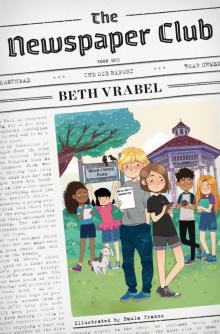 The Newspaper Club
The Newspaper Club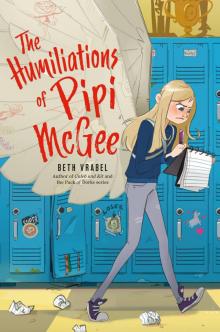 The Humiliations of Pipi McGee
The Humiliations of Pipi McGee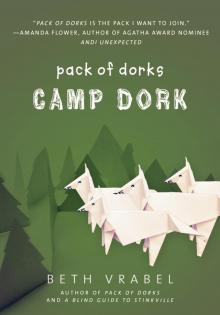 Camp Dork
Camp Dork Pack of Dorks
Pack of Dorks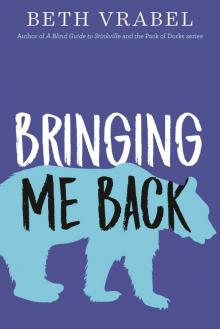 Bringing Me Back
Bringing Me Back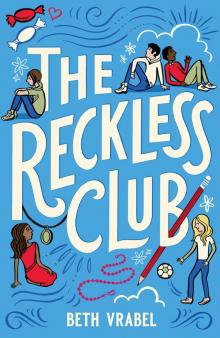 The Reckless Club
The Reckless Club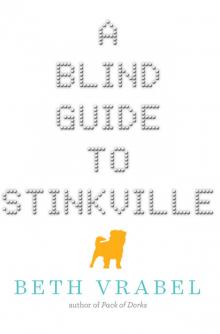 A Blind Guide to Stinkville
A Blind Guide to Stinkville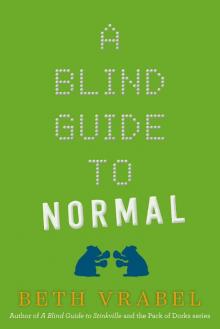 A Blind Guide to Normal
A Blind Guide to Normal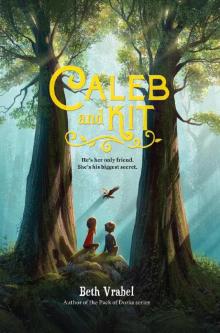 Caleb and Kit
Caleb and Kit